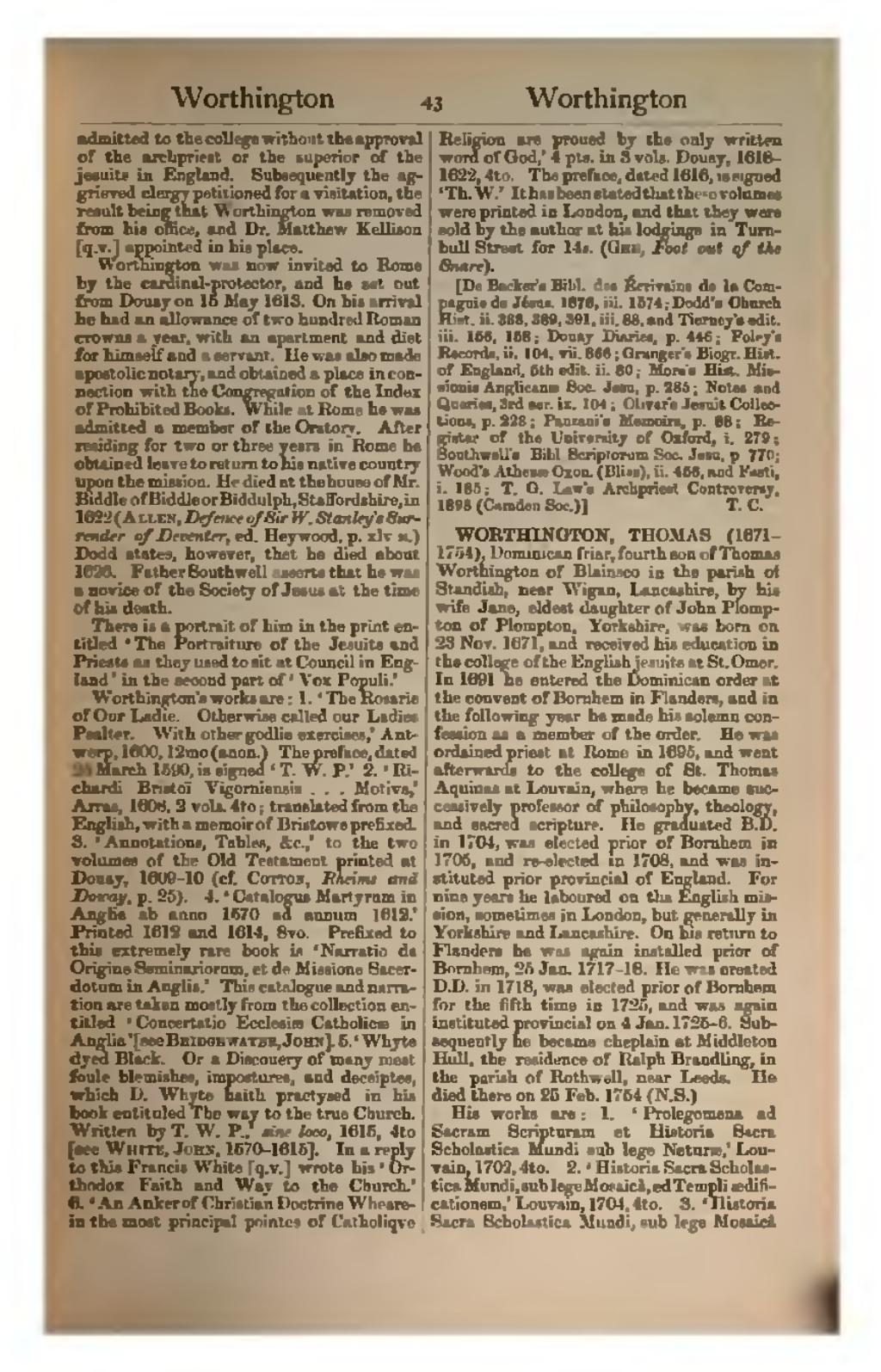admitted to the college without the approval of the archpriest or the superior of the Jesuits in England. Subsequently the aggrieved clergy petitioned for a visitation, the result being that Worthington was removed from his office, and Dr. Matthew Kellison [q. v.] appointed in his place.
Worthington was now invited to Rome by the cardinal-protector, and he set out from Douay on 15 May 1613. On his arrival he had an allowance of two hundred Roman crowns a year, with an apartment and diet for himself and a servant. He was also made apostolic notary, and obtained a place in connection with the Congregation of the Index of Prohibited Books. While at Rome he was admitted a member of the Oratory. After residing for two or three years in Rome he obtained leave to return to his native country upon the mission. He died at the house of Mr. Biddle of Biddle or Biddulph, Staffordshire, in 1622 (Allen, Defence of Sir W. Stanley's Surrender of Deventer, ed. Heywood, p. xlv n.) Dodd states, however, that he died about 1626. Father Southwell asserts that he was a novice of the Society of Jesus at the time of his death.
There is a portrait of him in the print entitled ‘The Portraiture of the Jesuits and Priests as they used to sit at Council in England’ in the second part of ‘Vox Populi.’
Worthington's works are:
- ‘The Rosarie of Our Ladie. Otherwise called our Ladies Psalter. With other godlie exercises,’ Antwerp, 1600, 12mo (anon.) The preface, dated 25 March 1590, is signed ‘T. W. P.’
- ‘Richardi Bristoï Vigorniensis … Motiva,’' Arras, 1608, 2 vols. 4to; translated from the English, with a memoir of Bristowe prefixed.
- ‘Annotations, Tables, &c.,’ to the two volumes of the Old Testament printed at Douay, 1609−10 (cf. Cotton, Rheims and Douay, p. 25).
- ‘Catalogus Martyrum in Anglia ab anno 1570 ad annum 1612.’ Printed 1612 and 1614, 8vo. Prefixed to this extremely rare book is ‘Narratio de Origine Seminariorum, et de Missione Sacerdotum in Anglia.’ This catalogue and narration are taken mostly from the collection entitled ‘Concertatio Ecclesiæ Catholicæ in Anglia’ [see Bridgewater, John].
- ‘Whyte dyed Black. Or a Discouery of many most foule blemishes, impostures, and deceiptes, which D. Whyte haith practysed in his book entituled The way to the true Church. Written by T. W. P.,’ sine loco, 1615, 4to [see White, John 1570−1615]. In a reply to this Francis White [q. v.] wrote his ‘Orthodox Faith and Way to the Church.’
- ‘An Anker of Christian Doctrine Whearein the most principal pointes of Catholiqve Religion are proued by the only written word of God,’ 4 pts. in 3 vols. Douay, 1618−1622, 4to. The preface, dated 1616, is signed ‘Th. W.’ It has been stated that those volumes were printed in London, and that they were sold by the author at his lodgings in Turnbull Street for 14s. (Gee, Foot out of the Snare).
[De Backer's Bibl. des Écrivains de la Compngnie de Jésus, 1876, iii. 1574; Dodd's Church Hist. ii. 388, 389, 391, iii. 88, and Tierney's edit, iii. 156, 158; Douay Diaries, p. 446; Foley's Records, ii. 104, vii. 866; Granger's Biogr. Hist, of England, 5th edit. ii. 80; More's Hist. Missionis Anglicanæ Soc. Jesu, p. 285; Notes and Queries, 3rd ser. ix. 194; Oliver's Jesuit Collections, p. 228; Panzani's Memoirs, p. 88; Register of the University of Oxford, i. 279; Southwell's Bibl. Scriptorum Soc. Jesu, p. 770; Wood's Athenæ Oxon. (Bliss), ii. 406, and Fasti, i. 185; T. G. Law's Archpriest Controversy, 1898 (Camden Soc.)]
WORTHINGTON, THOMAS (1671−1754), Dominican friar, fourth son of Thomas Worthington of Blainsco in the parish of Standish, near Wigan, Lancashire, by his wife Jane, eldest daughter of John Plompton of Plompton, Yorkshire, was born on 23 Nov. 1671, and received his education in the college of the English Jesuits at St. Omer. In 1691 he entered the Dominican order at the convent of Bornhem in Flanders, and in the following year he made his solemn confession as a member of the order. He was ordained priest at Rome in 1695, and went afterwards to the college of St. Thomas Aquinas at Louvain, where he became successively professor of philosophy, theology, and sacred scripture. He graduated B.D. in 1704, was elected prior of Bornhem in 1705, and re-elected in 1708, and was instituted prior provincial of England. For nine years he laboured on the English mission, sometimes in London, but generally in Yorkshire and Lancashire. On his return to Flanders he was again installed prior of Bornhem, 25 Jan. 1717−18. He was created D.D. in 1718, was elected prior of Bornhem for the fifth time in 1725, and was again instituted provincial on 4 Jan. 1725−6. Subsequently he became chaplain at Middleton Hall, the residence of Ralph Brandling, in the parish of Rothwell, near Leeds. He died there on 25 Feb. 1754 (N.S.)
His works are:
- ‘Prolegomena ad Sacram Scripturam et Historia Sacra Scholastica Mundi sub lege Naturæ,’ Louvain, 1702, 4to.
- ‘Historia Sacra Scholastica Mundi, sub lege Mosaicâ, ad Templi ædificationem,’ Louvain, 1704, 4to.
- ‘Historia Sacra Scholastica Mundi, sub lege Mosaicâ
